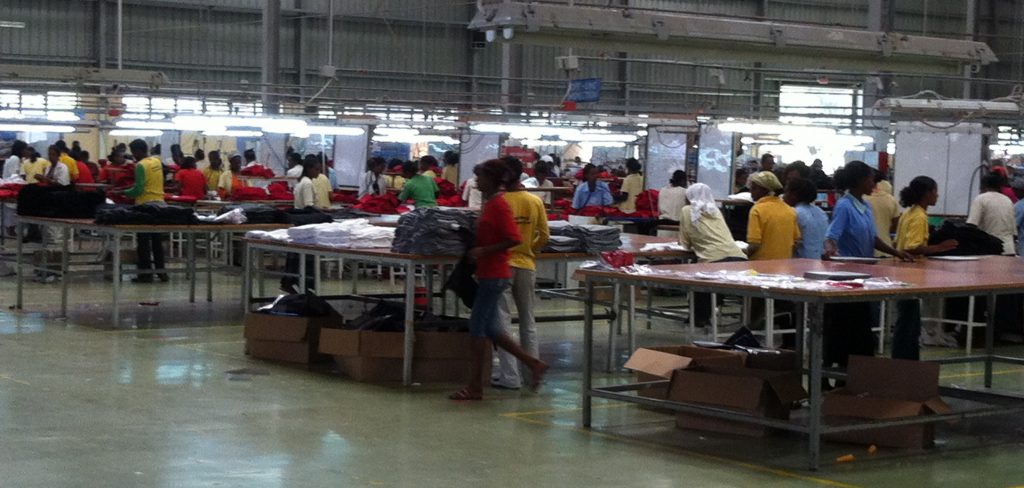Guest post by Jeff Mosenkis of Innovations for Poverty Action. Chris Blattman & Stefan Dercon have an op-ed in the New York Times, reporting on their study with IPA and the Ethiopian Development Research Institute. They randomly offered poor workers in Ethiopia who were applying for factory jobs the jobs they wanted or an alternative entrepreneurship opportunity. Turns out the jobs were pretty bad – most quit and those that stayed weren’t any better off than those who never god a job offer (the entrepreneurs did pretty well though.) Similarly to what Chris discussed with Russ Roberts on EconTalk, they conclude that middle management and professionalization is really what’s lacking in industrialization, along with a more robust social safety net to support those looking for better jobs.
Topics:
Jeff Mosenkis (IPA) considers the following as important: academia, blattman, dercon, development, Economics, Ethiopia, ezra klein, factories, freakonomics, health, industrialization, links, miscellany, mortality, New York Times, news, Op-ed, podcasts, productivity, psychology, Research, work
This could be interesting, too:
Lars Pålsson Syll writes Schuldenbremse bye bye
Lars Pålsson Syll writes What’s wrong with economics — a primer
Lars Pålsson Syll writes Krigskeynesianismens återkomst
Lars Pålsson Syll writes Finding Eigenvalues and Eigenvectors (student stuff)
Guest post by Jeff Mosenkis of Innovations for Poverty Action.
- Chris Blattman & Stefan Dercon have an op-ed in the New York Times, reporting on their study with IPA and the Ethiopian Development Research Institute. They randomly offered poor workers in Ethiopia who were applying for factory jobs the jobs they wanted or an alternative entrepreneurship opportunity. Turns out the jobs were pretty bad – most quit and those that stayed weren’t any better off than those who never god a job offer (the entrepreneurs did pretty well though.) Similarly to what Chris discussed with Russ Roberts on EconTalk, they conclude that middle management and professionalization is really what’s lacking in industrialization, along with a more robust social safety net to support those looking for better jobs.
- Jonathan Morduch presented new findings from Bangladesh. He, with Lee, Ravindran, Shonchoy, and Zaman, encouraged rural migrants who were going to cities to find factory work to use mobile money, and found it bumped up remittances to their families back home. There were all sorts of positive savings and poverty outcomes (but not consumption). Similar to what Blattman and Dercon found in Ethiopia though, this came at the expense of worse health for the factory workers.
- Some podcast recommendations:
- On FT Alphachat, Princeton economist Anne Case discusses her triad of papers that have made a big splash about the middle-age white mortality and “deaths from despair” (overdoses, alcohol, and suicide). (iTunes)
- In addition to the actual findings, what was really interesting was to hear was how she and her co-author have searched for explanations by engaging with colleagues in other fields like sociology and medicine (many of the findings were out there separately, but hadn’t been put together systematically), as well as how they engaged productively with methodological critiques.
- Freakonomics has a couple of episodes with a collection of big name economists (I believe the technical term is a Davos) to ask how they’d design a new economy from the ground up. But better is a few episodes back “Why is My Life So Hard” where they talk to a couple of experimental psychologists who asked – if we know how good gratitude is for well-being, why are people always complaining about what’s going wrong in their life? They dub it “headwinds/tailwinds asymmetry” – we take the good for granted but always notice the bad – and go into some fun studies (in pairs of siblings, each thinks the parents treated the other better) then how to avoid the trap. (Part of their inspiration is Louis C.K.’s observation, that Everything’s Amazing and Nobody’s Happy, similar observations to what Max Roser and Hans Rosling have made about the general state of humanity.) iTunes
- Ezra Klein’s interview with computer scientist Cal Newport, about taking your life back from technology in the age of distraction, was very good (iTunes)
- The first and most popular episode of Finding Impact speaks with Liz Jarman of Living Goods about how their entrepreneurial model of healthcare delivery in Uganda is reducing childhood mortality significantly, and how the RCT data helped change the way they expanded into Kenya. (iTunes)
- On FT Alphachat, Princeton economist Anne Case discusses her triad of papers that have made a big splash about the middle-age white mortality and “deaths from despair” (overdoses, alcohol, and suicide). (iTunes)
- Automakers met this week with the heads of the EPA and Department of Transportation about rolling back Obama-era fuel efficiency standards, but a new paper finds that higher efficiency standards led to lighter cars, and fewer deaths in traffic accidents. Using the statistical value of a life, they argue the lives saved alone economically justify the higher standards:
This result is critical for policy: our illustrative calculations suggest that CAFE standards are more likely to have positive net benefits once we account for the saved lives. Further, CAFE may have positive net benefits even if the value of future fuel savings is not included as a benefit.
(h/t Alexander Berger)
When studies have suggested a gender gap in tenure, I’m not sure they were talking about The Gap actually having a women’s clothing line called “The Tenure Track Professor” (J Crew’s Assistant Professor line seems less than practical too). Still waiting for a men’s relaxed fit Tenure Track Suit. (h/t Laura Seay)
While the Gap is selling "tenure track professor" blazers, the adjunct blazer is for sale at Goodwill. The lining is made of crushed dreams. pic.twitter.com/EGkgXAI0dR
— Kaya Oakes (@kayaoakes) April 26, 2017

